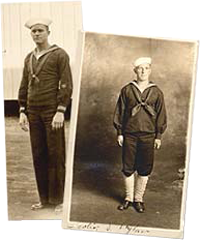Historical Overview
Page Content
The State Council in Overview

These photographs of sailors were among the hundreds submitted to the State Council of Defense for Oregon. They became part of the personal military service records that document Oregon's World War I veterans. (OSA, Oregon Defense Council Records, World War I Personnel Photographs)
The State Council of Defense for Oregon was formed in April 1917 in response to instructions issued by the federal Council of National Defense. The state council took steps to make the economy more efficient, coordinated, and focused on the war effort. It promoted patriotism, war drives, the Oregon Military Police, home guard organizations, a youth labor program, and other related activities.
It also organized numerous conferences that brought together state and local agencies to achieve particular goals. These goals included using institutions of higher education in the war effort and attending to the legal, medical, and other needs of enlisted men.
In 1918 the council hired a state historian, who would appoint county historians and collect a permanent record of the war effort in Oregon. The primary duty of the state historian was collecting information about Oregon servicemen. The Oregon Department of Education was enlisted to gather information on servicemen through school districts. This resulted in detailed personal data on the majority of men serving from Oregon.
In December 1918 after the war ended, the council's executive secretary issued a statement to its county and community chairmen. He informed them that the council would "cease to operate as an unofficial department of the State Government" on Jan. 1, 1919. But he called on the local chairmen to maintain the organization on a voluntary basis to help where needed in the effort to return the state to its peacetime status. And the state council continued as an entity for some time, with no salaries paid, and with incidental expenses paid by its members. Especially vital for securing the record of Oregon's role in the war, the state historian continued to collect records and assist a state Medal Selection Committee until 1922.